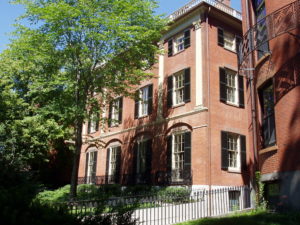 Otis House
Otis House
Bulfinch Presentation Drawing
Federal Architectural FeaturesWhat Makes it Federal?
When Charles Bulfinch returned to Boston from Europe in the 1790s, he decided he would not settle down to any one business but spent several years giving architectural advice to his friends. At that time architecture was not considered a profession, but rather a leisurely pursuit for wealthy gentlemen. Bulfinch designed all three houses that the Otises built. The architect’s presentation drawing seen here displays the many features of Federal architecture. Note the low hip roof, flanking chimneys, marble string courses, neoclassical decoration, Palladian window, elliptical fan light above the door with side lights, lunette window, and symmetry of the house.
This drawing was created by Bulfinch in 1796 to communicate his design idea for the new Otis family home. The final structure came close to the rendering but did not include the second floor balconies, triple-hung windows, or the swag panels.
Lunette window
Palladian window
Elliptical fanlight over door with side lights
Low hip roof
Windows get smaller as they go up the facade
Marble string course
to learn more
The Second and Third Otis Houses
From Bowdoin to Beacon
Preserved with relatively few changes to the exterior, the second of three houses that architect Charles Bulfinch designed for Harrison Gray and Sally Foster Otis was built in 1800 on Mt. Vernon Street, and is composed of a lower arcaded story ornamented with monumental Corinthian pilasters above. The house is privately owned, and is one of the few free-standing houses remaining on Beacon Hill. Number forty five Beacon Street was the third mansion designed by Bulfinch for the Otises within a span of ten years. Each of the Otis mansions was considered to be grander than the one before, and this one would have been considered the quintessence of elegance in the year it was built, 1806. Originally free standing and known for its lavish entertainments, the house was occupied by Harrison Gray Otis for forty two years. Today it is the headquarters of the American Meteorological Society.